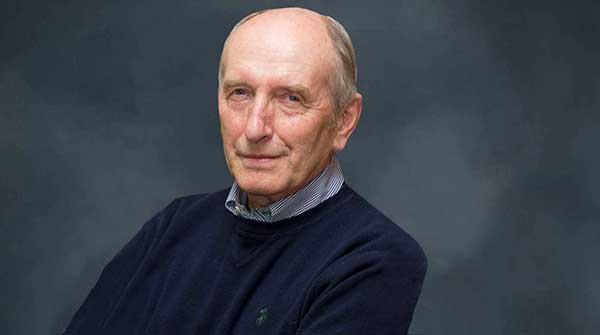Vaclav Smil is a prominent thinker in the field of energy systems and their impact on society. He will be speaking in Calgary this month
 Vaclav Smil is coming to Cowtown.
Vaclav Smil is coming to Cowtown.
If you’re remotely interested in how energy systems work – and energy’s role in how the world’s socio-economic, political, and technological systems really work – go see him.
It will be worth the $300.
But if you go expecting him to declare fossil fuels are the best thing since sliced bread and that renewables are the worst thing since adult shingles, you’re doing Smil’s scholarship and your own intellect a significant disservice.
In other words, don’t expect to hear a “Rah, Rah, Rah evangelical-cheerleading hydrocarbons-rule” chorus for the oil and gas sector’s ongoing existence into an infinite future.
 Vaclav Smil |
| Related Stories |
| Canada’s energy goals need a reality check
|
| Fossil fuels remain key to Canada’s economy and security
|
| Canada needs a climate Sense and Sensibility listening panel
|
That may be what a superficial cherry-picking interpretation of his words might suggest, but that’s not Smil’s schtick.
Indeed, it’s nowhere near the point(s) he’s been making over an amazing scholarly corpus and career spanning many decades. He’s 80 now and shows no sign of slowing his prodigious output of (painstakingly) thoughtful and often challenging-to-grasp linkages and interdependencies that connect fossil fuels to life.
Smil is a systems thinker who presents his views on fossil fuels in that systems context. He presents facts and figures as threads woven into larger and complex tapestries of meaning. From that weaving new, and often startling, patterns and perspectives emerge to produce a unique way of thinking about the pros and cons of fossil fuels.
He’s no oily or gassy cheerleader. Rather, he’s merely a pragmatist. And the more deeply you engage with his work (across various books and time spans), the more you’ll grasp some critical nuances about the good, the bad and the ugly about fossil fuels. Read him just once, and you’ll think he is little more than a crusty curmudgeon shaking his fist at the clouds.
Nothing is farther from the truth.
You need to read. Then re-read. Go out and view the world around you based on what you’ve just read. And then re-read some more. Then read what his proponents have to proclaim and what his critics have to declaim. You’ll also be a better interlocutor and interpreter – a better “Smilite,” should that be your desire – by surveying how Smil’s thinking is parlayed, conveyed, even inappropriately appropriated, by others.
He’s a tough read, but we ought to be thankful for that as we step into energy’s current tough transition paradigm. Smil would have us understand that what we’re currently experiencing, with all its contestations and complexities, is merely the latest phase of systems change over centuries. You read that right: centuries.
Energy systems change, posits Smil, is slow, agonizing and protracted. Change ebbs and flows and speeds and slows as the global economy, sitting atop myriad local economies, twists and contorts and governments of many ideologies tie themselves in knots on energy and economic issues at the complex nexus of politics, policy, technology, and societal dynamics.
It’s tempting to think that, if you’re a superficial skimmer of his work, Smil soundly endorses fossil fuels. A better, if more visceral, way of approaching his take on oil and gas is to contemplate the worst of all brain cancer news: the tumour is so entrenched in so many places within the brain structure it’s pretty much inoperable – hydrocarbons of course, being the malignancy and society writ large being the brain matter itself.
But we’re living the current paradigm’s realities, so it is challenging to fit our day-to-day views of things into past patterns and future uncertainties – particularly as it relates to the “buzziness and fuzziness” of a world in which every second headline relates to decarbonization and Net Zero.
In a recent private (unpublished) paper entitled “Halfway,” crafted last fall, Smil reflected on where the world sits on a time scale between the Kyoto Protocol and the holy grail of 2050. He acknowledges fully the extensive impact of emissions on climate and ecosystem health but also points out our collective addiction to fossil fuels means we’re “net-net” increasing emissions in toto even while seeing significant reductions in specific locales – and that we have no real chance of hitting 2050 with anything remotely resembling net zero balancing short of some miraculous, and cataclysmic, change event.
From Halfway:
“On the face of it, and even without performing any informed technical and economic analyses, this seems to be an impossible task given that we have less than three decades to do it and that we have not even reached the peak of global consumption of fossil carbon, while we still have not deployed any zero-carbon large-scale commercial processes to produce essential materials, and while the electrification of road transport has, by the end of 2022, converted only about 2 percent of passenger vehicles (more than 26 million) to different varieties of battery-powered cars.20 All of this comes as no surprise to students of energy history as global energy transitions have always been protracted affairs.”
Smil grasps hydrocarbons and their role in transitioning energy systems over time as well as anyone in the world. No, not as well as.
Better than anyone.
He gets that the world is addicted to fossil fuels. And he describes in various ways the price(s) we’re paying for that addiction – including a failure to advance effectively toward other energy horizons, notwithstanding an apparent frenzy of activity on fronts like carbon capture and storage.
In other words, Smil’s take on fossil fuels and their role in “how things work” is part of a byzantine and sluggish system of affairs in which mankind is the master of its own destiny, however dire.
The biggest disservice you can do for Smil (and yourself) is to selectively rupture facts from the admittedly complex matrix in which he places them in order to be a mindless evangelist for fossil fuels.
His critics accuse him of profound pessimism. But that’s because they’re not inclined to appreciate the subtexts he offers in which fossil fuels are not the best solutions to the world’s woes, but they’re the best we have until we figure out how to leap to the next Kuhnian energy paradigm.
So, come. Listen carefully. If you come away with nothing more than a more nuanced appreciation of how to access and appreciate the subtleties of his thinking, you’re on a path to a better understanding of how things really work.
Bill Whitelaw is a director and advisor to many industry boards, including the Canadian Society for Evolving Energy, which he chairs. He speaks and comments frequently on social licence, innovation and technology, and energy supply networks.
The Canadian Energy Executive Association is hosting Dr. Smil on Feb. 22 as part of its annual Beyond Boomers half-day conference. For more information, click here.
For interview requests, click here.
The opinions expressed by our columnists and contributors are theirs alone and do not inherently or expressly reflect the views of our publication.
© Troy Media
Troy Media is an editorial content provider to media outlets and its own hosted community news outlets across Canada.
